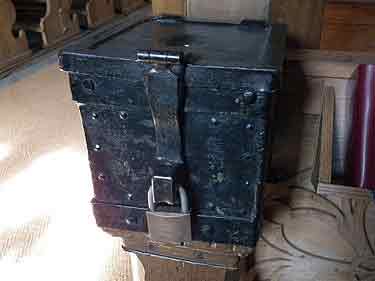Corbanus: Difference between revisions
No edit summary |
No edit summary |
||
| Line 1: | Line 1: | ||
[[Corbanus]] like the word Corban had to do with a treasury. The word "Corban" was from the ancient [[Hebrew]] world appearing in the New Testament twice, once as [[Corban]] and once as ''treasury''. It is from a word meaning [[Sacrifice]]. | [[File:Corbanus.jpg|right]][[Corbanus]] like the word Corban had to do with a treasury. The word "Corban" was from the ancient [[Hebrew]] world appearing in the New Testament twice, once as [[Corban]] and once as ''treasury''. It is from a word meaning [[Sacrifice]]. | ||
The sacrifices of the people in Israel were [[Freewill offerings|freely given]] to [[Levite]] ministers or [[Priests]] of their choice to take care of the needs and needy of society. Those free offerings and the aid they provided in liberty and love bound an honorable society together in charity and hope by faith in [[The Way]] of Christ. | The sacrifices of the people in Israel were [[Freewill offerings|freely given]] to [[Levite]] ministers or [[Priests]] of their choice to take care of the needs and needy of society. Those free offerings and the aid they provided in liberty and love bound an honorable society together in charity and hope by faith in [[The Way]] of Christ. | ||
Revision as of 09:35, 8 May 2016

Corbanus like the word Corban had to do with a treasury. The word "Corban" was from the ancient Hebrew world appearing in the New Testament twice, once as Corban and once as treasury. It is from a word meaning Sacrifice.
The sacrifices of the people in Israel were freely given to Levite ministers or Priests of their choice to take care of the needs and needy of society. Those free offerings and the aid they provided in liberty and love bound an honorable society together in charity and hope by faith in The Way of Christ.
These Freewill offerings of people who came together in free assemblies or congregations of ten sustained society according to the perfect law of liberty mentioned by Paul who was helping the people do the same in the early Church.
One of the chief difference between the Jews like the Pharisees and those who followed Christ is that their offerings or Corban were based on charity. This dependence upon charity rather than the socialist free bread of Herod and the Roman welfare state began with John the Baptist and continued for centuries beyond the fall of Rome.
The early church called the box they put funds or food etc. in order to take care of the needs of the people Corbanus after the Hebrew word Corban.
Other words like corballum or corbella became words for a basket in which food or grain was gathered for the poor.
Also the word corbanus is seen later referring to a rural dean (plebanus) in Ireland.
The word "dean" came from variations of the word for ten like deacon because one of the most common form of government was the tens or tuns, hundreds and thousands of Israel, the Celts and Tuetons and countless people of history who formed free societies.
There is a story about a ruler in Ireland in the fifth century named Cuirbin who was a churl or miser. He reportedly saw some monks going to an island in frail boats to build a monastery. He offered them some grain and provisions in jest knowing their boats could not carry the barrels and barely themselves.
The monk named Enda seemed perceived the lack of sincerity in his offer but he continued in mockery saying it was from "his heart". Enda agreed to take them anyway. The story is that the barrels and sacks suddenly lifted off the ground and flew over the heads of the men in the direction of the island presumably to the other beach.
Later Cuirbin became Cuirbin the Devout which was altered eventually to St. Corbanus because he did begin to give from the heart freely.
The monasteries and island also housed Brendan the Navigator who supposedly came to America in in the fifth century with a number of monks in seal skin boats.
Sacrifice
Altars
Stones |
Clay and Stone |
Stones upon |
White stones |
Lively Stones of a Living Altar |
Sophistry |
Leaven |
Breeches |
Stoning |
Altars |
Church legally defined | Sacrifice of fools
Graven images |
Red Heifer | Reserve fund
Corban |
Tithing In Conscience |
Self-Sacrifice |
Pure Religion |
Legal charity |
Public religion |
Worship |
Welfare |
Welfare types |
Daily ministration
Christian conflict |
Benefactors |
Feasts |
Good Samaritan |
Thy first love |
Born again |
New creature
Celebrate |
Temples |
Modern Christians |
The Blessed Strategy
Power To Change |
Peine forte et dure |
Tithing |
Offering |
Korban
Korab |
Minchah
Necek |
Nedabah
Shelem |
Tenuwphah
Teruwmah
Charity |
Freewill offerings |
Corban
Religion |
Pure Religion |
Golden rule |
Altars |
Tens |
Network |
Pentecost
Perspective |
One purse |
Temptations |
Tithe |
Tithing |
Tithing In Conscience |
Tithingman |
Tribute |
Taxation |
Treasury |
Corban |
Charitable Practices |
Covetous Practices |
Fervent Charity |
Gleaners |
FEMA |
Lady Godiva |
If you need help:
- Or want to help others:
Join The Living Network of The Companies of Ten
The Living Network |
Join Local group |
About |
Purpose |
Guidelines |
Network Removal
Contact Minister |
Fractal Network |
Audacity of Hope |
Network Links